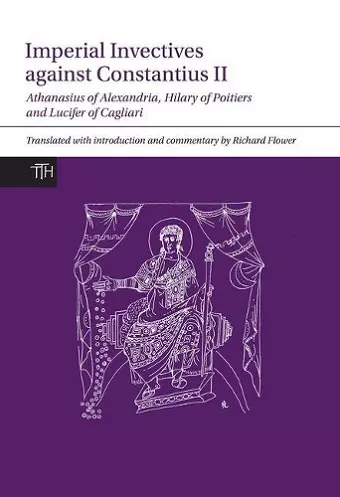Imperial Invectives against Constantius II
Athanasius of Alexandria, History of the Arians, Hilary of Poitiers, Against Constantius and Lucifer of Cagliari, The Necessity of Dying for the Son of God
Format:Hardback
Publisher:Liverpool University Press
Published:12th Dec '16
Should be back in stock very soon

The Roman emperor Constantius II (337–361) has frequently been maligned as a heretic, standing in sharp contrast to his father Constantine I, who set in motion the Christianisation of the Roman world and the establishment of Nicene orthodoxy. This reputation is the result of the overwhelmingly negative presentation of Constantius in the surviving literature written by orthodox Christians, who regarded him as an ‘Arian’ persecutor. This volume presents new translations of texts that were central to the shaping of this hostile legacy: Athanasius of Alexandria's History of the Arians, Hilary of Poitiers' Against Constantius and Lucifer of Cagliari's The Necessity of Dying for the Son of God. These contemporary invectives against the emperor were composed by three bishops who all opposed Constantius’ religious policies and were exiled by the imperial and ecclesiastical authorities during the 350s. By constructing polemical accounts of their sufferings at the hands of the emperor and his supporters, these authors drew on the traditions of both classical rhetoric and Christian persecution literature in order to cast Constantius as imitating villains such as Ahab, Judas and Nero, while presenting themselves as fearless opponents of impious tyranny. Moreover, as the earliest surviving invectives against a living Roman emperor, the writings of these three bishops offer a unique opportunity to understand the place of polemical literature in the political culture of the later Roman empire. The translations are accompanied by a substantial introduction and notes which provide a clear guide to the historical and theological context of the period, as well as literary analysis of the texts themselves. This volume will therefore be valuable both to those studying the religious and political history of Late Antiquity and the Early Middle Ages and also to anyone interested in the development of Roman rhetoric and early Christian literature.
Reviews 'Richard Flower makes a worthy addition to a fine series ... This is a good book; the translation accurate, the introduction concise without over-simplication, the notes adequate.'
Lionel Wickham, Journal of Ecclesiastical History
'This is a model example of the genre: the material Flower is discussing is difficult and the historiography disputatious, but he is clear, judicious, insightful and consistently interesting ... Flower’s is a volume which every historian of Late Antiquity will want to have on their bookshelf. It will also serve as an ideal introduction for students to the fascinating literature produced by the ‘anti-Arians’ of the mid-fourth century. One can only hope that Flower might be persuaded to issue a sequel at some point in the future.'
George Woudhuysen, Journal of Roman Studies
'Overall, the quality of scholarship, translations, and printing makes for an aesthetically appealing and extremely useful volume that merits a place on scholarly bookshelves as well as in the classroom and university library. This volume is a welcome addition to the growing body of scholarship that invites non-specialists to go beyond the narrow confines of the Constantinian question and to explore the vast horizons of the fourth century at greater length.'
Richard Westall, Plekos
‘For those of us interested in late antique invective, Flower’s work – with introduction, translation, and commentary, all excellent – deserves kudos and our gratitude.’
Mark Gustafson, Early Medieval Europe
ISBN: 9781781383278
Dimensions: unknown
Weight: unknown
272 pages